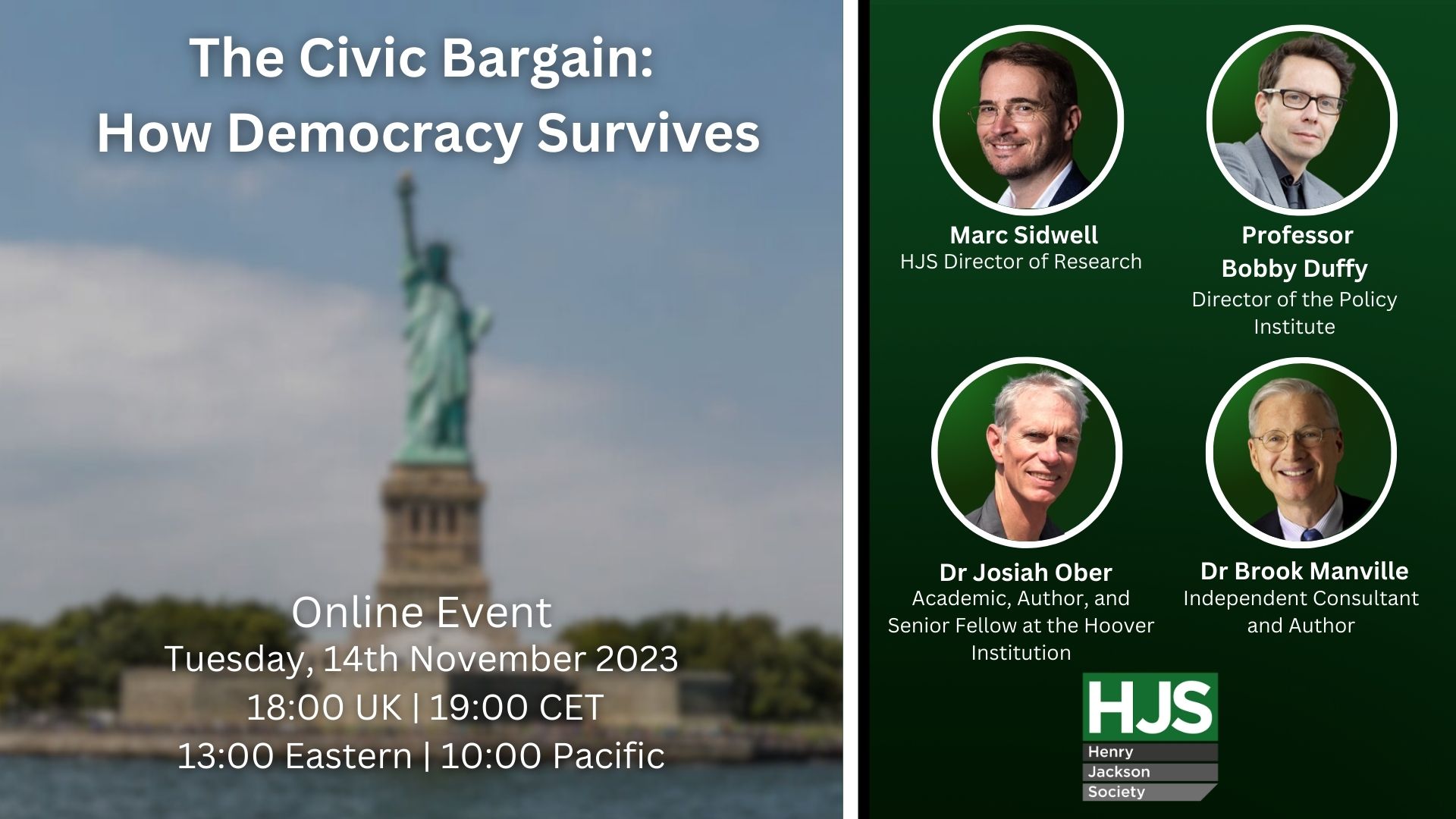The Civic Bargain: How Democracy Survives

- This event has passed.
The Civic Bargain: How Democracy Survives
14th November 2023 @ 6:00 pm - 7:00 pm

Is democracy in trouble, perhaps even dying? Pundits say so, but is the future of democracy necessarily so dire? In their new book The Civic Bargain, Brook Manville and Josiah Ober push back against the prevailing pessimism about the fate of democracy around the world. Instead of an epitaph for democracy, they offer a guide for democratic renewal, calling on citizens to recommit to a “civic bargain” with one another to guarantee the rights of freedom, equality, and dignity.
The Civic Bargain traces the long progression toward self-government through four key moments in democracy’s history: Classical Athens, Republican Rome, Great Britain’s constitutional monarchy, and America’s founding. Comparing what worked and what failed in each case, Manville and Ober draw out lessons for how modern democracies can survive and thrive.
The Henry Jackson Society is delighted to welcome you to a discussion with the authors of The Civic Bargain, and also with Bobby Duffy, director of the Policy Institute at King’s College London. Professor Duffy will explore what the data from the World Values Survey can tell us about attitudes to democracy in the UK and the rest of the world – and how quickly they can change. Join us for a thought-provoking discussion about how democracy can survive its contemporary threats.
You can purchase the book HERE. Please note that a discount code for the book will be provided to the guests who will be attending the talk.

Brook Manville is an independent consultant who writes about politics, democracy, technology, and business. Previously a partner with McKinsey & Co. and an award-winning professor at Northwestern University, he is the author of The Origins of Citizenship in Ancient Athens (Princeton) and A Company of Citizens: What the World’s First Democracy Teaches Leaders About Creating Great Organizations (with Josiah Ober).

Josiah Ober is the Constantine Mitsotakis Professor in the School of Humanities and Sciences at Stanford University and Senior Fellow at the Hoover Institution. He is the author of The Rise and Fall of Classical Greece, Democracy and Knowledge: Innovation and Learning in Classical Athens (both Princeton), The Greeks and the Rational: The Discovery of Practical Reason, and other books.

Bobby Duffy is Professor of Public Policy and Director of the Policy Institute. He has worked across most public policy areas in his career of 30 years in policy research and evaluation, including being seconded to the Prime Minister’s Strategy Unit. Bobby sits on several advisory boards including Chairing both the Campaign for Social Science and the CLOSER Advisory Board. His first book, The Perils of Perception – Why We’re Wrong about Nearly Everything draws on a set of global studies on how people misperceive key social realities. His latest book, Generations – Does When You’re Born Shape Who You Are?, came out in September 2021 and challenges myths and stereotypes around generational trends, seeking a greater understanding around generational challenges.

Marc Sidwell is Director of Research at The Henry Jackson Society. He has worked as a senior editor for the Telegraph and City A.M. and as publisher for the New Statesman. Marc has also written regularly for publications including Telegraph, The Critic, National Review and City A.M. He is a Senior Fellow at the New Culture Forum, and a graduate of Oxford and Warwick.
***
EVENT SUMMARY
The Henry Jackson Society was pleased to hear from Brooke Manville, Josiah Ober and Bobby Duffy about their new book, ‘The Civil Bargain: How Democracy Survives’. Democracy is facing challenges today, and some believe it is dying. However, looking at historical cases of democracy reveals that bargaining has been crucial to its growth. Democracy is essentially about people governing themselves, and bargaining is the way they make decisions and compromise to keep everyone moving forward. Brooke argued that bargaining is crucial for democracy’s growth and the Civic Bargain is the set of rules, norms, and practices that citizens negotiate to govern themselves. It’s the undercarriage of democracy and allows it to survive and flourish. Josiah established that the Civic Bargain is the set of rules, norms, and practices that citizens negotiate to govern themselves. The Civic Bargain is formed after a revolution or when the elites are disenfranchised, and the power passes to the people. This is the constitutional moment in the United States, and it’s the time when people start to figure out how they are going to work together and make decisions without a boss telling them what to do. The Civic Bargain is important because it allows people to govern themselves in a way that is fair and just. It also helps to ensure that democracy is stable and can survive over time.
Bobby discussed findings from the World Values Survey, highlighting the UK’s tolerance and acceptance of diversity. Despite cultural war narratives, the UK remains comfortable with different lifestyles and shows positive shifts in attitudes towards immigration. There’s continued support for democratic principles, with no generational decline in the UK. However, institutional confidence, particularly in the police, has declined, and there are signs of potential polarisation tied to political identity, emphasising the need to counter cultural narratives and focus on common ground.
RELATED EVENTS
British General Election Campaigns 1830-2019: Can The Past Inform The Future?”
The British general election is the linchpin of our liberal democracy, and its results are often fundamental to how we live. With the next UK general election looming, there is therefore … Continued



